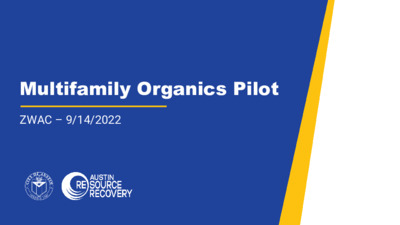Multifamily Composting Pilot Study Presentation — original pdf
Backup

Multifamily Organics Pilot ZWAC – 9/14/2022 Background • Resolution 20191017-028 • Universal Recycling Ordinance – organics diversion requirements for food service businesses only • Multifamily properties (>4 units) required to provide access to recycling for residents • About 55% of Austin households are in multifamily properties • 95% of those are renters Resolution 20191017-028 Multifamily Properties • Apartments • Condominiums • Including detached homes • Townhomes • Dormitories • Nursing homes / assisted living facilities • Mobile homes • 1,800 properties in Austin Existing Composting Options for Multifamily • Drop-off sites • Community gardens • Farmers’ Markets • Neighbors/friends with ARR carts • Backyard composting • Valet opt-in collection • Full-service collection offered to all residents Additional Research • Researched and interviewed other municipalities with multifamily organics programs • Collection - Boulder, CO; Seattle, WA; New York, NY • Drop-Off – Washington D.C., Charlotte, VA; NYC • Researched existing multifamily organics pilots • San Francisco • Investigated properties in Austin with existing organics collection • Commercial Organics Pilot – Austin, 2012 Input from URO Committee • Onsite collection systems rather than drop-off • Large sample size • Geographic representation • 6 month pilot Input from Stakeholders • Meeting Dates: 4/23/19, 6/4/19, 1/8/20 • Stakeholders: haulers, multifamily property managers, Austin Apartment Association Pilot Goals • Identify challenges and best practices • Understand cost impacts • Inform future policy recommendations Property Recruitment • Began in 2019 • Put on hold for COVID • Restarted in Winter 2020 • On hold due to Uri • Restarted in Spring 2021 • Calls, emails, newsletters, social media • 8 properties participated Service Delivery • Properties chose their own service provider and contracted for services at market rates • Up to 6 months of rebated service • Service levels chosen by property management • Cart-based or valet service • Locked containers • Simulate real-world scenario Education • Virtual information session • Language interpretation available • Kitchen collectors with labels • Bilingual how-to guides • Letters • Website Data Collection • Weekly container audits • Identify materials • Contamination • Container fullness/use • Management Surveys • 3 months and end of pilot • Resident Survey • End of pilot • Invoices Results Survey Caveats Resident Survey Responses 157,446 830 76 Percent of Residents per Property that used the Pilot Compost/Organics Service according to Management Average Springhollow Condominiums Seminary of the Southwest Riverwalk Condominiums St. Edward's Chamonix Condominiums Banister Place Stassney Lane Condominiums Foundation Communities Lakeline 0% 10% 20% 30% 40% 50% 60% Service Level Property Name Dwelling Units Number of containers Container size (gallons) Gallons / week service level Gallons / Unit / Week 130 Chamonix Condominiums Seminary of the SW 38 32 Banister Place 132 Foundation Communities Lakeline Station Riverwalk Springhollow Condominiums Stassney Lane Condominiums* 142 63 114 St. Edwards 178 4 1 1 2 2 3 2 104 64 64 65 64 64 64 5 64 256 64 65 128 128 192 520 128 1.97 1.68 2.03 0.97 0.9 3 4.56 0.72 *used a valet collection service. Weekly Audit Observed Container Fill Level e c n a r u c c O 25 20 15 10 5 0 0% 25% 50% 75% 100% Above 100% Survey Results How often did you use the pilot compost/organics service at your community? 47% 11% 9% 7% 26% Never Rarely Sometimes Very Often Always What resources did you find helpful? 0 10 20 30 40 50 60 Personal kitchen compost collector/bucket Compostable bags Paper how-to guide Virtual information session Video of recorded information session Multifamily Compost Pilot website I did not use any resources Other I did not find any resources helpful Challenges managers • Contamination • Lack of participation – reported by half of Costs • Costs vary based on service level provided and number of carts • Larger properties with more carts see a lower per- cart fee and therefore a lower per unit cost • Smaller properties will see a higher cost burden that is passed on to residents Costs • Valet service: $50 per unit per month • Community cart-based service: $51 – 112 per cart per month • Per unit costs: range $0.80 - $2.95 for community collection and $50 for valet Next Steps • URO Committee meetings with stakeholders • Including stakeholders identified in Council Resolution • Next meeting 10/6/22 • After stakeholder process, develop recommendations for Council